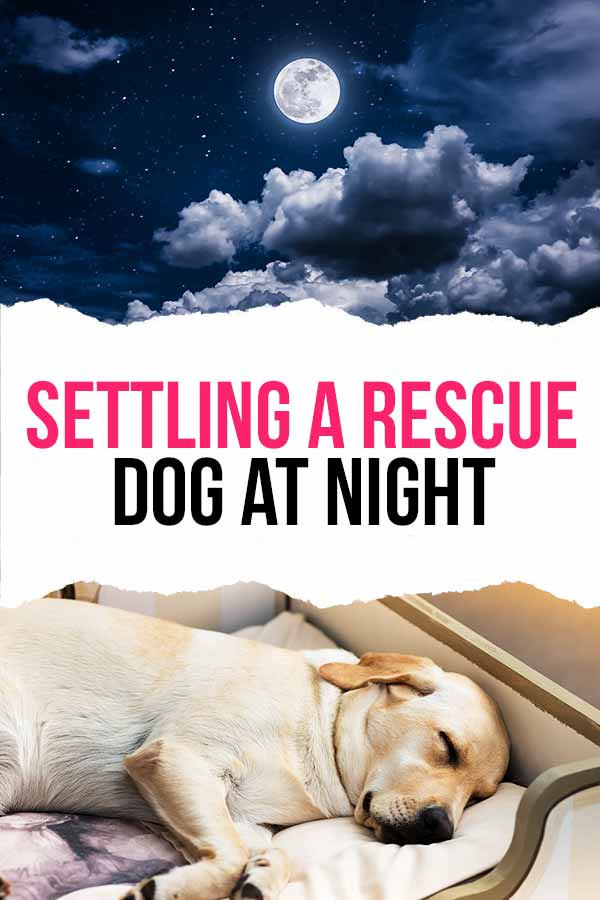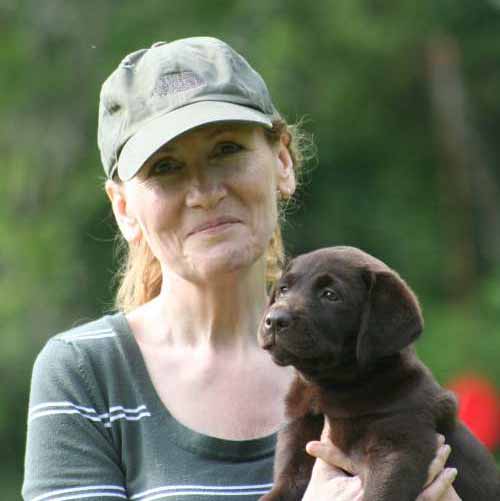
Settling a rescue dog at night is easier with a little advance preparation and expectation management.
They will settle better if they feel safe, secure and confident in their new home.
We have a few tips and tricks to make their first few nights at home easier.
Settling a Rescue Dog At Night
The day you bring your rescue dog home is a momentous occasion for you both.
There are going to be some exciting changes in your life, but there are also likely to be things you feel apprehensive about.
Including settling your new dog at night.
What if they don’t settle at all? What if they cry or bark, and keep you awake or disturb the neighbors?
Might they damage the room they’re in, while you sleep obliviously on upstairs?
Are they going to need the toilet in the night? Will they realise they need to wait to be let out in the morning?

Like lots of unfamiliar situations, the prospect of a rescue dog’s first night at home can end up being more nerve-wracking than the reality.
But we’ve got lots of tips to help you feel prepared, and set you up for the best chance of success.
Your New Rescue Dog
Lots of dog adopters get a huge sense of satisfaction from giving an unlucky dog a second chance at a happy pet life.
Their “gotcha” day marks a landmark moment, from which they’re going to be safe, wanted and loved in their new home.
But of course, only we know that’s what’s happening at the time.
For the dog being rescued, the move to a new home can be intimidating and stressful.
They don’t know yet that the place they’re arriving in is a kind place, where they’ll be looked after.
And it can be hard to relax in a place where everything is unfamiliar.
The First Night
These feelings of being uncertain, insecure and hyper alert in their new environment can be especially hard to deal with during the first night.
Your dog is tired, but isn’t sure if it’s safe to relax yet.
And you’re tired but you can’t relax for wondering what your dog is doing.
They might also be crying, whining, or barking, to tell you that they’re unhappy.
It’s enough, when we’re tired and emotional after a big day, to make anyone question whether they have, in fact, made a terrible mistake.
But Here’s The Good News
In an Italian survey of 300 people returning adopted dogs back to the shelter, none of them reported doing so because the dog didn’t sleep at night.
Just like us, dogs need sleep!
In fact, they need even more of it than we do. Adult dogs sleep, on average, for 8 – 16 hours out of every 24.
So there’s nothing to stop you teaching good sleeping habits to your rescue dog, and we’re going to explain how you can do it as quickly as possible.
A Good First Night Begins With A Good First Day
A good night’s sleep starts with your dog feeling safe and secure in their new environment.
- Try to meet your dog at the rescue shelter or with their foster family several times before you bring them home, if possible.
- Not all shelters have the resources to facilitate this. But if you can start to build a bond with a dog before you bring them home, it will be easier for them to apply the positive feelings they have about you to their new home as well (which smells a lot like you after all).
- Collect your new friend as early in the day as possible, to give them lots of time to settle in at home before night time.
- Be careful not to overwhelm them with attention, or information. Keep them confined to a small area of the house which includes their sleeping area and a door to the place they’re going to use as a toilet.
- Save the grand tour of the rest of the home for when they’ve had a chance to adjust to their new surroundings
- Try, as much as possible, to appear quite disinterested in your dog, until they approach you. Coercing a new rescue dog into being petted before they’re ready can be very stressful for them
Get Their Bed Ready
Whilst they’re acclimatising to their new home, start to teach them that one of the best, happiest, most delightful places in it is… their bed of course!
Have their bed set up before they get home, and prime it with some tasty treats to find.
Once your dog is home, keep replenishing the treats whenever their back is turned.
If they settle in their bed during the first day, very calmly place further treats under their nose every now and then.
But resist the urge to pet them in bed, or invade that space while they’re relaxing.
The Goal
The aim of all this is to teach your dog that your home is a safe place to be.
And that they are welcome to explore it at their own pace, and that they won’t be made to feel uncomfortable.
Furthermore, their bed is a wonderful, rewarding place to be. That good things happen when they’re in it, and they don’t need to be on guard.
The First Night With A Rescue Dog
When the time to turn in for the night comes you have three choices:
- Leave them and their bed where they are, and go to your own bed.
- Take them and their bed upstairs to your room with you.
- Or keep them and their bed where they are, and set up a temporary bed for yourself in the same room
Each has different advantages.
Option 1 – Leave them in their bed, and go to your bed
In option 1, if it works, you get to skip straight to the ideal end scenario in the shortest time.
But if your rescue dog doesn’t feel confident sleeping alone in your home yet, you might find that he cries, whines, or barks instead of going to sleep.
In this scenario you also might not hear if he gets up to use the toilet in the night, or when he wakes up for his first toilet trip of the day.
Dogs kept in rescue shelters often get used to toileting on hard indoor floors, because the shelter staff couldn’t take them out often enough, and they had no choice.
So your dog might not realise straight away that your kitchen tiles aren’t an acceptable toilet.
Only pre-empting his toilet needs and making sure he’s outdoors will change the habit of peeing inside.
Option 2 – Take them upstairs with you
Your new rescue dog has a strong emotional need to feel safe, just like you or I.
Letting her stay near your side is an effective way of meeting that need, until she’s settled enough in your home to feel safe in a different room at night.
Having her next to you also means that you’ll hear her if she wakes up in the night.
If you’re not comfortable having her in your room overnight in the long term, then once she’s fully settled you can start moving her bed by a foot every couple of nights, until it’s where you want her to sleep.
Option 3 – Join them downstairs
There are lots of reasons why new pet parents would rather not have their rescue dog in their room, even for a short time.
For example if the bedroom is already a safe retreat for a pet cat.
Or their rescue dog isn’t comfortable being crated, and it’s not safe to risk them waking up and wandering around upstairs.
Joining them downstairs on a temporary basis is a good solution which combines the advantages of both the other options.
But it does mean leaving your own bed for a few nights!
Settling A Rescue Dog At Night – Toilet Breaks
Lots of dogs experience digestive upsets and mild diarrhea when they’re stressed or going through a big experience.
A lot of humans can probably sympathize!
So it’s possible your dog will need to get up in the night, or earlier than usual in the morning to use the toilet.
To avoid setting up a situation where your dog cries for your attention, and is rewarding by getting it, consider setting an alarm and taking them out before they can ask halfway through the night and first thing in the morning.
Try and make this event as boring as possible on your part – no talking, petting, giving treats or playing games.
It’s a tiring business, but you should only need to do it for the first two or three nights.
If your rescue dog still has persistently loose or urgent poops after that, take them to a vet to rule out underlying causes such as parasitic infections.
To Cry It Out, Or Not?
Dog trainers are divided about whether letting a rescue dog cry it out works.
And if it works, whether it is kind.
On the one hand, it tends to work very quickly.
But it has several drawbacks:
- It keeps everyone awake, tired, and upset.
- It’s antisocial if you have neighbors.
- And if you eventually cave after 5 hours, it reinforces crying for five hours the next night.
Keeping your rescue dog close to you for the first few nights creates a sense of security for them in your home which means that they are unlikely to cry.
How To Get A Rescue Dog To Sleep – Other Things To Try
Settling a rescue dog at night demands a little patience, commitment, and accepting the possibility of a few nights’ broken sleep.
If your dog is still struggling to settle at night after several days, here are some more things you can try:
And orthopedic mattress
If your rescue dog is a mature adult, or even a senior dog, then they might be starting to experience some joint discomfort.
Particularly larger breeds, which are more prone to problems like hip dysplasia.
A thick, memory foam mattress might be what they need to comfortably support their weight overnight.
A heat mat
Old dogs, small dogs, and dogs with thin coats sometimes feel the cold.
But their bed is usually at ground level, where it gets drafty, and often in an underheated part of the house, like a mud room.
A heat mat or hot water bottle securely wrapped in a towel might help them get to sleep.
A heartbeat simulator
Dogs don’t just end up in shelters because they misbehaved. Many were beloved pets whose previous owners could no longer keep them.
That means they might be used to a completely different sleeping arrangement to the one you had in mind. Specifically, they might have always slept with other animals or even people before.
A heartbeat simulator toy plays the soft sound of a heartbeat, and for dogs who are used to sleeping with company, it can be very soothing.
Your unwashed sweater
A handy tool you already have lying on the floor of your closet!
Gifting your rescue dog something which smells like you for a couple of nights can help with transitions, like when the time comes for you to leave your temporary bed in the kitchen, and return to your own room.
Settling A Rescue Dog At Night – Summary
A rescue dog’s first 24 hours at home represents a period of massive upheaval for them.
And that can mean difficulty sleeping.
Preparing for their arrival, being considerate of their feelings on their first day home, and keeping them company for the first few nights can all make the move less stressful.
The overarching aim is to meet your rescue dog’s emotional need to feel safe and secure in your home, so that eventually they are confident sleeping there alone.
Luckily, whilst the upheaval can cause short term sleep disruption, most rescue dogs settle in at night pretty quickly.
How Was your Rescue Pup’s First Night With You?
Have you got any tips and advice for new adopters?
Please share them in the comments box down below!
References and Further Reading
Bodizs et al. Sleep in the dog: comparative, behavioral and
translational relevance. Current Opinion in Behavioral Sciences. 2020.
Mondelli et al. The Bond That Never Developed: Adoption and Relinquishment of Dogs in a Rescue Shelter. Journal of Applied Animal Welfare Science. 2010.
Segurson. Managing and Rehoming the Rescue Dog and Cat. BSAVA Manual of Canine and Feline Behavioural Medicine. 2009.

Free Training Tips
Get Pippa's free dog training tips delivered to your inbox

 Why Do Puppies Scratch The Carpet?
Why Do Puppies Scratch The Carpet?
We rescued a two year old dog a month ago and she is great other when it’s time to go into her crate. She barks incessantly. I like your
tip about hiding treats in her bed in the crate. Unfortunately, to compound matters, she appears to be deaf, which we’re hoping is temporary since she had severely impacted yeast infections in her ears and is being treated for that. Any special tips you have for
training a deaf dog would be greatly appreciated!
If pet proof and such could also just roam the floor with stuff by that point and age (and pee pad in hokder allows option for them to go when they want)
My rescue is 11 yrs old and deaf. He is close to us a night in our hallway and a baby gate separating our bed room from him. He get up and tries to take down the baby gate. The only thing that separates us is a few feet. What can I do to help him sleep all night and also not get up a 4:30am as well.
I found out when Piper was about a year and a half old that her blanket wasn’t doing her any good. My answer it turned out (after some research) was, as you suggested, springing for an orthopedic mattress and cover from Big Barker. She’s large at 96 lbs and needed good support. If you do decide on one be advised they are pricey but there are lots of advantages for the big dog especially. I recommend the waterproof liner. About a year after I bought the bed I bought an extra cover so I can rotate washing them and always have a clean bed cover ready. Getting a great bed for her turned out to be a good decision.
I picked up my rescue black Labrador a couple of years ago when she was 14 months old. She was a poorly trained, reactive dog. I had no experience other than looking after a couple of friends’ labs.
I thought that she might struggle the first night and I was keen not to respond to barking during the night so…….I spoke to my neighbour and explained that I was going to ignore barks or whines during the middle of the night. She was totally ok with this. I had arranged to borrow the crate and bed that Meg had occupied in the shelter and placed her new bed beneath it. She had a midnight visit to the garden for a last wee then I escorted her to the crate, closed the door and went to bed. I didn’t hear a thing all night and I bet she slept way better than me!
A couple of years on, she occasionally barks during the night and my husband has let her out. Unfortunately, I think that he makes a bit of a fuss of her consequently, she started to bark more during the night. So…..the new plan is to make her go out last thing before my husband goes to bed then ignore the barking during the night. We are definitely making progress. For two nights she had a period of barking which we ignored and we have just had a week of no night barking. Dogs work on expectations and when you don’t deliver, they tend to give up. We dispensed with the crate a few months after bringing her home and we haven’t looked back. She sleeps downstairs anywhere that she feels comfortable. She lives a charmed life.